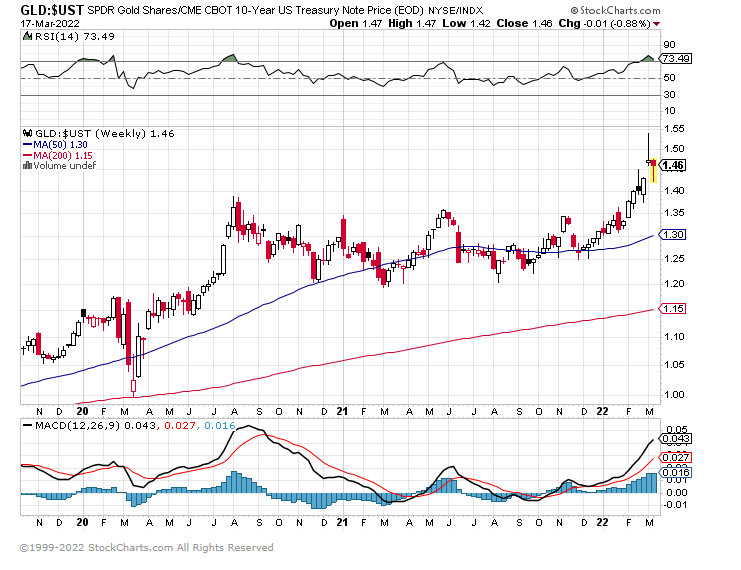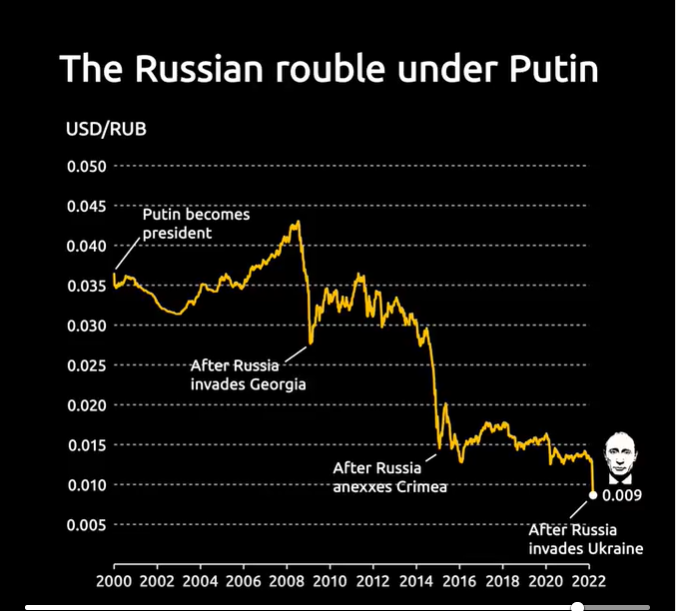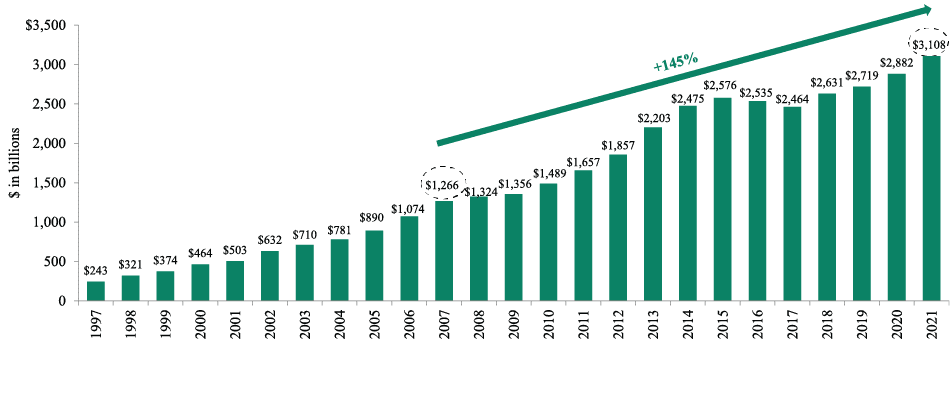1. Over the Last 8 Years Global Central Banks Bought $260B Gold vs. $60B Treasuries
In a podcast with Grant Williams, Gromen said that over the last eight years, global central banks have bought about $260 billion worth of gold, compared to $60 billion in Treasurys. “So there’s been this very slow, but steady and recently accelerating move toward the away from this dollar system that broke in 2005, through 2008 to this system that looks a lot like what was proposed by [John Maynard] Keynes 80 years ago,” he says.
This chart is showing gold vs. 10 year U.S. treasury….Gold clear break-out of 2 year sideways channel.

2. The Russian Ruble Under Putin.

James Eagle https://www.linkedin.com/in/
3. The High Yield Bond Default Rate Plummeted to Lows

Does this signal the start of the next distressed cycle? No one knows. What we do know is that a record amount of non-investment-grade debt is outstanding in the U.S. – over $3 trillion at the end of 2021 (see Figure 5). So there are plenty of leveraged companies out there that are only one idiosyncratic event away from being an actionable target for special situations investors. And in an imperfect world, that’s something you can count on happening over and over and over again.
Figure 5: U.S. Leveraged Debt Outstanding Has Ballooned

Source: S&P Global Leveraged Commentary & Data
Oakmark Research
The Roundup: Top Takeaways From Oaktree’s Quarterly Letters – 1Q2022 (oaktreecapital.com)
4. 30 Year Mortgage Averaging 4% Nationally

5. Coffee -17% Correction in one month

6. Gas Production from American Shale Already at New Record

7. Annual Venture Capital Funding Shatters All Records…..100+ Unicorn Births Every Quarter


https://www.cbinsights.com/research-new-normal-in-venture?utm_source=linkedin&utm_medium=paid&utm_campaign=marketing_linkedin-retargeting_2022-02&utm_content=venture-persona&li_fat_id=162b6558-85f3-469c-8bc9-c67862048b5c
8. Housing Supply is Coming…Housing Starts Hit 16 Year High
This pushed Housing Starts to their highest SAAR since June 2006 as Permits pulls back from similar highs…

Source: Bloomberg from zerohedge https://www.zerohedge.com/
9. Poland Mobilizes Overnight to Take in 2m Refugees
Warsaw rolls out the red carpet for refugees

Nearly 3 million Ukrainians have fled the country since Russian forces invaded. Most of them—roughly 1.8 million—have arrived in neighboring Poland, and as many as 300,000 have settled in the capital, Warsaw.
They’ve received a hero’s welcome. The city’s government, businesses, and citizens mobilized remarkably fast and have opened 22 shelters in the city, enrolled nearly 2,800 Ukrainian children into its school system, donated food, and coordinated volunteer counselors and translators. Still, Warsaw and the rest of Poland are bursting at the seams, and they won’t be able to sustain what has become the fastest-growing refugee crisis in Europe since World War II on their own. Some services in bigger Polish cities are reaching capacity and officials are asking organizations like the UN to help spread out incoming Ukrainians.
Big picture: Some aid workers have highlighted the difference in treatment for the current refugees with those who’ve previously arrived in Europe from Middle Eastern and African countries.—MM |
https://www.morningbrew.com/
10. Luck and Executive Function–How belief in being lucky can have everyday benefits.
KEY POINTS
- Belief in oneself as lucky can have consequences for self-efficacy.
- Beliefs in oneself as unlucky can have consequences for the way we use our problem solving abilities.
- The question now might be which came first: seeing oneself as unlucky, or executive dysfunction?
There is a difference between the way luck is defined in the laboratory and the way we talk about it in everyday life. Many of us see luck as an individual characteristic we each possess, part of the set of characteristics that makes each of us unique. One of the most interesting results to come out of the psychology labs that have been investigating luck is a change in the assessment of the consequences of believing in luck.
It used to be that social and cognitive psychology saw belief in luck as a characteristic of people who had an external locus of control, and that external locus of control was associated with poorer mental health (depression, anxiety, and helplessness). Externally located people believed that what happened to them was the result of some force outside of their own abilities. This led to the idea that believing in luck was unhealthy because it requires that you see yourself as unable to control or influence what goes on around you.
Recent research is changing this view of luck and luckiness. Seeing luck as a characteristic of your “self,” as something that makes you unique in the world, may actually be beneficial. Research has shown that believing that you are a lucky person may be an indicator of good mental health because it is associated with a personal characteristic whose power is often overlooked—hope.
Liza Day and John Maltby have been studying our belief in luck and what it might be doing for us. In 2005, they conducted two studies that examined the relationship between believing in good luck, optimism, and hope. They first asked a very large set of undergraduates to take a series of paper-and-pencil tests that measured these three characteristics. They found that the stronger the belief in hope was, the more optimistic the person was, and the more they believed that their goals could and would be achieved. They also tended to feel confident that they would be able to find a way around any obstacles that might appear along the route toward achieving their goal. Hope, in particular, turned out to be the best predictor of how much the students believed in luck.
Then they asked another set of students to think about a real and important life goal, and to then rate how confident they were that they would be able to achieve that goal, how hopeful they were, and how much they thought luck might be necessary in achieving that goal. Their results showed that belief in good luck was particularly important when we’re coming up with a plan to achieve a goal.
article continues after advertisement
Seeing luck as a personal characteristic was associated with hope, optimism, and generally good mental health. So, does seeing yourself as unlucky have the opposite set of consequences? Do you also see yourself as hopeless, pessimistic, anxious, and depressed?
It turns out that the answer is…not exactly. Maltby et al., hypothesized that believing in your own unluckiness would have consequences for the way executive functions are used. Executive functions are mediated by our frontal lobes and include planning what to do next, coming up with alternatives when our first plan doesn’t work out, organizing what we know, switching from solving a problem in one way to solving it in another, and inhibiting an incorrect response.
Maltby and colleagues measured belief in personal unluckiness, optimism, self-efficacy, belief in the irrational in general, and executive functions. They found that the stronger one’s belief in personal unluckiness was, the weaker one’s belief in self-efficacy and the lower the levels of optimism were. People who saw themselves as unlucky also tended to be introverted, were more likely to hold irrational beliefs in general, were more difficult to get along with, and were less likely to try new things.
They asked their volunteers to take part in a task that tested their ability to switch from one problem-solving strategy to another, an aspect of executive function known as switching. The more unlucky a participant saw him- or herself as being, the worse their ability to switch from a simple task to a complex one.
Then, they asked participants to try their hand at the Stroop task designed to measure another aspect of executive functioning—the ability to suppress or inhibit a response. Participants saw three different kinds of stimuli appear on the screen, in random order. Congruent stimuli (where the word and the color of the ink the word was presented and matched—the word “pink” in pink ink for example), neutral stimuli, and incongruent stimuli (the word “pink” presented in green ink).
For most of us, reading is an automatic behavior, and we do it very well. In the Stroop task, you are asked to report the color of the ink and to ignore the word. This is much harder to do. It takes longer and we make more mistakes because we have to inhibit our natural, over-learned tendency to read the word. That inhibition is an executive function.
article continues after advertisement
The more unlucky people believed themselves to be, the longer they took on this task and the more mistakes they made. Seeing yourself as unlucky apparently made it even harder to suppress the reading response.
Maltby et al., went on to measure several other aspects of executive function and their relationship to believing oneself to be unlucky and concluded that people who saw unluckiness as a personal characteristic didn’t do well on these executive function tasks.
Seeing oneself as unlucky didn’t directly lead to depression and anxiety, but it was paired with a tendency toward executive dysfunction. The question now might be which came first: seeing oneself as unlucky, or executive dysfunction?
Barbara Blatchley Ph.D. https://www.psychologytoday.